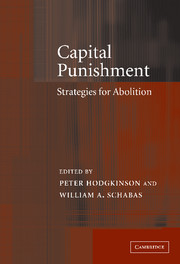Book contents
- Frontmatter
- Contents
- List of figures
- List of tables
- Notes on the contributors
- 1 Capital punishment: improve it or remove it?
- 2 International law and the death penalty: reflecting or promoting change?
- 3 Doctors and the death penalty: ethics and a cruel punishment
- 4 Replacing the death penalty: the vexed issue of alternative sanctions
- 5 Religion and the death penalty in the United States: past and present
- 6 On botched executions
- 7 Death as a penalty in the Shari'ā
- 8 Abolishing the death penalty in the United States: an analysis of institutional obstacles and future prospects
- 9 Capital punishment in the United States: moratorium efforts and other key developments
- 10 The experience of Lithuania's journey to abolition
- 11 The death penalty in South Korea and Japan: ‘Asian values’ and the debate about capital punishment?
- 12 Georgia, former republic of the USSR: managing abolition
- 13 Capital punishment in the Commonwealth Caribbean: colonial inheritance, colonial remedy?
- 14 Public opinion and the death penalty
- 15 Capital punishment: meeting the needs of the families of the homicide victim and the condemned
- Index
6 - On botched executions
Published online by Cambridge University Press: 22 September 2009
- Frontmatter
- Contents
- List of figures
- List of tables
- Notes on the contributors
- 1 Capital punishment: improve it or remove it?
- 2 International law and the death penalty: reflecting or promoting change?
- 3 Doctors and the death penalty: ethics and a cruel punishment
- 4 Replacing the death penalty: the vexed issue of alternative sanctions
- 5 Religion and the death penalty in the United States: past and present
- 6 On botched executions
- 7 Death as a penalty in the Shari'ā
- 8 Abolishing the death penalty in the United States: an analysis of institutional obstacles and future prospects
- 9 Capital punishment in the United States: moratorium efforts and other key developments
- 10 The experience of Lithuania's journey to abolition
- 11 The death penalty in South Korea and Japan: ‘Asian values’ and the debate about capital punishment?
- 12 Georgia, former republic of the USSR: managing abolition
- 13 Capital punishment in the Commonwealth Caribbean: colonial inheritance, colonial remedy?
- 14 Public opinion and the death penalty
- 15 Capital punishment: meeting the needs of the families of the homicide victim and the condemned
- Index
Summary
Introduction
On 21 February 1930, convicted murderer Eva Dugan, 52, was hanged from the gallows of the Arizona State Prison in Florence, Arizona. Witnesses were repulsed when Dugan sprang through the trap door on the gallows with such force that her head snapped off and rolled into a corner of the room. Public outcry over the botched execution was so loud that within four years the Arizona legislature abolished hanging and replaced it with a more ‘humane’ way of killing: the gas chamber.
Six decades later, the public and policy makers admitted that death by asphyxiation had its own problems. In April 1992, the Arizona gas chamber was mothballed after a horrifying spectacle during the gassing of death row inmate Donald Eugene Harding. Witnesses were sickened by the execution, calling it ‘violent’ and ‘ugly’, and reported that Harding was in great pain before his death mercifully came. Consequently, Harding's was the last mandated asphyxiation in Arizona. In November 1992, Arizona voters passed a ballot initiative that gave prisoners then on its death row a choice between gas and lethal injection and authorised lethal injection as the only means of execution for those sentenced to death thereafter.
One might think that in the United States, where technology exists to send astronauts to the moon with perfection, we should be able to shoot people to the hereafter with similar precision.
- Type
- Chapter
- Information
- Capital PunishmentStrategies for Abolition, pp. 143 - 168Publisher: Cambridge University PressPrint publication year: 2004
- 2
- Cited by



